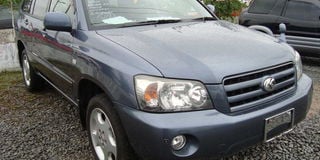Ask the Mechanic

SHOULD I SELL OR REFURBISH MY OLD CAR?
Hey Paul, I seek some advice from you about selling my 2003 Toyota Kluger. I have had this car for five years. I kept the engine and gearbox intact as well as the body is free of major accident repair. I frequently drive short distances between my office and home, shopping at my neighbourhood mall or visiting friends in town. I am deeply torn between keeping this beautiful old car and selling it to upgrade to the pricey 2007 Kluger. Please advise. Kate.
Hello Kate, the conflict in your mind over a decision to replace your well-maintained old car with a newer one is understandable.
Many motorists nowadays prefer to keep their well- maintained used cars rather than incur the cost of upgrading. While others choose to move on and enjoy the benefits of a newer car.
The motivation to keep your ‘old faithful’ car can be premised on the belief that its cheaper to maintain an existing old car than undertake the higher cost of buying a newer one.
Proponents for the case to buy a newer car argue that newer cars have significantly lower repair costs.
This argument is premised on the assumption that newer cars are in a better technical condition with lower mileage related parts wear and better reliability.
On the other hand, older cars tend to require many costly and unplanned mileage-related fixes and parts replacements such as suspension.
However these repair costs are still cheaper than the undertaking or sum spent to buy a newer car. It is worth noting that newer used cars will also occasionally break down and have costlier fixes because their repair parts are more expensive.
Newer cars tend to have better comfort features (better aesthetics), technology and styling.
Older cars were once comfortable and can have their interior upholstery refurbished or upgraded, convenience features restored or updated to modern standards and body repaired and repainted.
Newer cars usually have superior performance and fuel efficiency as well as better handling characteristics critical for highway driving. This is due to modern engine technology and suspension designs.
When you maintain your old car well by servicing all fluids and filters on time, and carrying out required fixes diligently, it will perform well enough to comfortably get you to your destination, after all you are mainly journeying around town.
There is the notion that some older cars are actually built tougher than the newer ones, talk about the age of plastics.
Kate, you can decide to keep your old faithful, refurbish and repair it while you save or invest your money elsewhere.

WHY ARE MY CAMRY IGNITION COILS FAULTY EVEN AFTER REPLACEMENT?
Hi Paul, recently I replaced my ignition coils when my Toyota Camry engine was stuttering and hesitating. While the engine performance and fuel consumption improved immediately, the check engine light keeps flickering intermittently. The mechanic says the diagnosis keeps reporting one of the ignition coils but its puzzling because they all seem to be fine.
Harris. K
Hello Harris, you may have a faulty engine ignition coil circuit (damaged socket or loose harness contacts) and not necessarily a faulty ignition coil(s).
An ignition coil is an induction coil in a car engine’s ignition system which transforms the battery’s voltage into thousands of volts which help the spark plug to create an electric spark to ignite fuel in your car engine.
When the ignition coil fails, it will cause a severe misfire and reduce the engine performance as well as fuel economy.
An ignition coil will fail when its internal circuit breaks or it prematurely leaks voltage or current due to physical damage. However, a damaged engine harness or connectors will prevent battery voltage from flowing to the ignition coil.
Ask your provider to inspect the harness and socket or connectors for the particular ignition coil reported by diagnosis. If the harness circuit is fine then you need to check the engine control module which authorises battery voltage flow to the ignition coils.

WHY DOES MY HILUX ENGINE VIBRATE AT 40 KM/H?
Hello Paul, I recently purchased a Toyota Hilux 2018 model with a 2.8L engine.
The car’s performance is perfect whether in acceleration, fuel consumption, stability on the road, name it. However, on acceleration, once the speedometer hits a 40kp/h mark, you feel vibrations in the engine.
Once it leaves the 40kp/h mark, it becomes smooth again meaning it only shakes when in the 40kp/h speed. What could be the problem?
Patrick Tumwebaze
Hello Patrick, engine vibrations at low speeds on your Toyota Hilux can be caused by one of the following; loose engine mountings, loosely fitted or damaged engine accessories or power consumers or a faulty transmission torque converter.
It could also be caused by an automatic gear box or a damaged clutch release bearing, if it is a manual transmission.
Engine mountings are rubber insulators that help to absorb and isolate engine vibrations from the car body.
When these mountings age or tear, the engine vibration may be prominent and felt in the car body especially during idling or low revolutions.
Loosely fitted or damaged engine accessories such as water pump or alternator can cause noticeable vibrations at low engine speeds.
A faulty transmission torque converter is another potential culprit especially as the automatic transmission transitions from lower to higher gears.
For manual transmission cars, a bad clutch release bearing can cause a similar vibration during upward gear shifts.
This sort of vibration is felt along the transmission tunnel to the engine.
Send sms: mycar (space) your comments and questions to 6933
Or email them to: [email protected]




